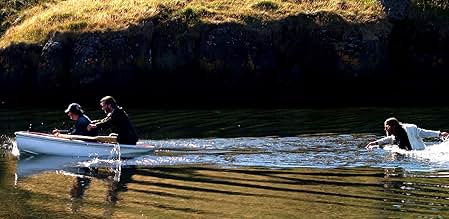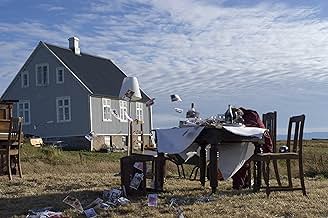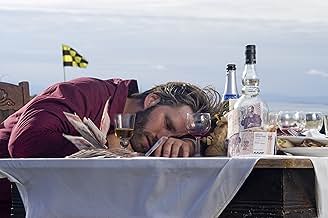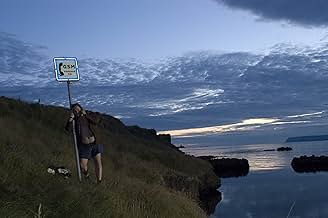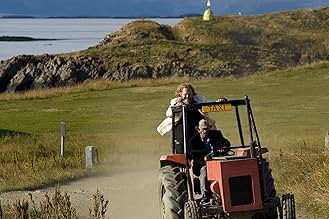IMDb-BEWERTUNG
6,6/10
1476
IHRE BEWERTUNG
Füge eine Handlung in deiner Sprache hinzuIn less than twenty-four hours, a middle-aged academic and his nearly half his age fiancée will get married in Iceland's windswept island, Flatey, amid endless preparations and bitter second... Alles lesenIn less than twenty-four hours, a middle-aged academic and his nearly half his age fiancée will get married in Iceland's windswept island, Flatey, amid endless preparations and bitter second thoughts. Is this what they really want?In less than twenty-four hours, a middle-aged academic and his nearly half his age fiancée will get married in Iceland's windswept island, Flatey, amid endless preparations and bitter second thoughts. Is this what they really want?
- Regie
- Drehbuch
- Hauptbesetzung
- Auszeichnungen
- 9 Gewinne & 8 Nominierungen insgesamt
Palmi Kormákur
- Child
- (as Pálmi Kormákur Baltasarsson)
Empfohlene Bewertungen
Unless there is a great answer... somewhere, there was no point to making this movie!
White Night Wedding leaves the audiences' minds spinning as we witness a wedding gone completely array. Baltasar Kormakur writes twisted story painted on the canvas of beautiful Iceland in complete juxtaposition to his first popular film 101 Reykjavik. As the movie unravels we witness the life of a middle aged professor, Jon, as he recovers from the suicide of his first wife and learns to accept a commitment to his second wife. In interview, Kormakur states that theme of the movie is the search for happiness, which is mixed with a few twists, turns and road blocks. Even against the odds, Jon finds his happiness as the audience enjoys Kormakur's sense of humor along the way. This movie offers moments of laughter but also leaves the audience guessing at what will happen next. We, as viewers, are drawn in by the music and the beautiful landscape and at the same time, put off, by suicide and debt issues that are intertwined into a cinematic masterpiece.
Nature evokes a great deal of emotion in this film and the symbolisms that accompany it are difficult to ignore. The first encounter the audience has with the drama surrounding nature is when Anna, Jon's first wife, strikes a swan with her car. We are met with the vivid image of crimson blood on white feathers. Shortly thereafter, the couple moves back to Anna's home town which is a small but charming island. Here, Anna's deep connection with nature comes alive. Though it is clear she is mentally unstable there is something charming about her devotion for nature. She tends to the sea like her garden when she creates a web of seaweed. In addition to Anna's devotion to nature, Kormakur frequently uses aerial shots of the island. Through these shots the audience is able to view the exquisite serenity of the Icelandic land.
Other themes emerge throughout the film, such as the theme of infectious mental illness. We can see Anna's mental illness and how it leaches into the lives of others. Anna forces Jon to leave his position of professor because she longs to be home. After moving back to her home island she loses trust in Jon, and any love left in their marriage slowly fades. After Anna encounters Jon during a sexual affair with a previous student, Þóra, her depression worsens and she is driven to suicide. Jon, wears the weight of her suicide around like a heavy cloak. Though, his affair did not help his wife's depression, he blames himself fully for her death and repeatedly says that he killed her. This notion that he was responsible for sucking the life from Anna, is the barrier that stand between him and his love for Þóra. This debt that he feels to his deceased wife is not relieved until he flings himself into the sea where she committed suicide. Jon's debt does not end there however.
Jon is also a debtor in the monetary sense. When Jon returns to the Iceland for his second marriage to Þóra he is sought out by his friends and family who hound him for money. We encounter his soon to be mother in law, shortly after arriving to the island. Immediately upon meeting her we can see that she is not pleased with his past actions. In fact he owes her a great deal of money for a golf course plan run amok. His mother doesn't trust his intentions with her daughter and is so hung up on his debt she can't see the devotion between Þóra and Jon. Nevertheless, this is not his only debt owed on the island. The morning of his wedding, Jon is awoken by breaking glass as golf balls are flung through his window. Börkur, an angry friend of Jon's is also here to collect a debt owed to him. From every angle, Jon is bombarded by his debts and his sins which again do not appear to be reconciled until his plunge in the ocean.
Quite possibly my favorite theme in the movie, is that of music. Music seems to permeate all areas of this film. The first experience we have with music being performed in the film is through the musical talent of Anna. Anna requests that a piano be sent to her island home. Later it is during times of turmoil that we see her passionately playing. Other characters are deeply involved in music also. Lárus, the soon to be father in law of Jon sings beautiful opera throughout the film. My favorite scene is most definitely his early morning dip where he awakens the inhabitants of the island with is booming operatic voice.
There is also a great deal of parallel between the "old" life of Jon with his deceased wife and his new life with Þóra. About half of the movie is made up of flashbacks, these flash backs are presumably the memories of Jon. At times it is difficult to differentiate between the present and the past. This is done to portray the stark difference between Anna and Þóra and the difference between past unhappiness and current happiness. This is enforced by the dreary and dark weather of past scenes compared with the bright scenes of the present. At the same time this is in contrast with the static portrayal of the island and its people. The audience can see that life for Jon changes dramatically while the small sleepy town remains consistent and folksy. This theme of rural life is a common theme in many Icelandic films.
In conclusion Kormakur puts on a great show. Though this film is not similar to his past success, 101 Reykjavik, it holds its own position in his collection of films. The message of a search for happiness is theme that most can relate with. Along with this the audience enjoys the gorgeous nature in the film and beautiful music. All elements in combination make a quite striking film.
Nature evokes a great deal of emotion in this film and the symbolisms that accompany it are difficult to ignore. The first encounter the audience has with the drama surrounding nature is when Anna, Jon's first wife, strikes a swan with her car. We are met with the vivid image of crimson blood on white feathers. Shortly thereafter, the couple moves back to Anna's home town which is a small but charming island. Here, Anna's deep connection with nature comes alive. Though it is clear she is mentally unstable there is something charming about her devotion for nature. She tends to the sea like her garden when she creates a web of seaweed. In addition to Anna's devotion to nature, Kormakur frequently uses aerial shots of the island. Through these shots the audience is able to view the exquisite serenity of the Icelandic land.
Other themes emerge throughout the film, such as the theme of infectious mental illness. We can see Anna's mental illness and how it leaches into the lives of others. Anna forces Jon to leave his position of professor because she longs to be home. After moving back to her home island she loses trust in Jon, and any love left in their marriage slowly fades. After Anna encounters Jon during a sexual affair with a previous student, Þóra, her depression worsens and she is driven to suicide. Jon, wears the weight of her suicide around like a heavy cloak. Though, his affair did not help his wife's depression, he blames himself fully for her death and repeatedly says that he killed her. This notion that he was responsible for sucking the life from Anna, is the barrier that stand between him and his love for Þóra. This debt that he feels to his deceased wife is not relieved until he flings himself into the sea where she committed suicide. Jon's debt does not end there however.
Jon is also a debtor in the monetary sense. When Jon returns to the Iceland for his second marriage to Þóra he is sought out by his friends and family who hound him for money. We encounter his soon to be mother in law, shortly after arriving to the island. Immediately upon meeting her we can see that she is not pleased with his past actions. In fact he owes her a great deal of money for a golf course plan run amok. His mother doesn't trust his intentions with her daughter and is so hung up on his debt she can't see the devotion between Þóra and Jon. Nevertheless, this is not his only debt owed on the island. The morning of his wedding, Jon is awoken by breaking glass as golf balls are flung through his window. Börkur, an angry friend of Jon's is also here to collect a debt owed to him. From every angle, Jon is bombarded by his debts and his sins which again do not appear to be reconciled until his plunge in the ocean.
Quite possibly my favorite theme in the movie, is that of music. Music seems to permeate all areas of this film. The first experience we have with music being performed in the film is through the musical talent of Anna. Anna requests that a piano be sent to her island home. Later it is during times of turmoil that we see her passionately playing. Other characters are deeply involved in music also. Lárus, the soon to be father in law of Jon sings beautiful opera throughout the film. My favorite scene is most definitely his early morning dip where he awakens the inhabitants of the island with is booming operatic voice.
There is also a great deal of parallel between the "old" life of Jon with his deceased wife and his new life with Þóra. About half of the movie is made up of flashbacks, these flash backs are presumably the memories of Jon. At times it is difficult to differentiate between the present and the past. This is done to portray the stark difference between Anna and Þóra and the difference between past unhappiness and current happiness. This is enforced by the dreary and dark weather of past scenes compared with the bright scenes of the present. At the same time this is in contrast with the static portrayal of the island and its people. The audience can see that life for Jon changes dramatically while the small sleepy town remains consistent and folksy. This theme of rural life is a common theme in many Icelandic films.
In conclusion Kormakur puts on a great show. Though this film is not similar to his past success, 101 Reykjavik, it holds its own position in his collection of films. The message of a search for happiness is theme that most can relate with. Along with this the audience enjoys the gorgeous nature in the film and beautiful music. All elements in combination make a quite striking film.
Icelandic film that would appear to be your typical romantic comedy judging by the movie poster. There's a whole lot more happening than the goofy mess that can be found in the U.S. theaters almost every weekend. This is art house goodness in almost every sense. What a beautiful, unique location this takes place in: a small, car-less island just off the coast of Iceland. A man is about to marry a woman half his age and has flashbacks to his previous wife and what happened in that marriage in the year leading up to this wedding. There are so many emotions going through several of these characters. The story almost seamlessly flips back and forth between past and present. Blink and you might miss which time frame it's in. A pretty interesting story that so easily helps establish the fact that foreign (to me) cinema is often much better than typical American trash! (Oh, and there's a great joke included about big burger butt Americans! Haaa!!!)
7.1 / 10 stars
--Zoooma, a Kat Pirate Screener
7.1 / 10 stars
--Zoooma, a Kat Pirate Screener
Hmmmmm. And an admiring hmm at that. First thing I thought of is the same kind of emotional juxtaposition or almost confusion that rings through this movie as Reykevik 101 (the director's first film). Back then I was very uncomfortable with that, now still not normal per se but more manageable yet kind of refreshing.
Base on an Chekhov's Ivanov, the film alters back and forth wonderfully over time on events before and immediately leading up to a wedding on an island between an professor and a young girl. While the story's theme obviously stated in the movie and told by the director in Q&A, is about searching for happiness and doing the "right" thing, many hilarious moments are interjected directly with the dramatic moments and vice versa. And these moments of emotional swings are very immediate creating a push and pull effect. And this might affect some audience immersing into the story.
Q&A also brought out the same cast also acted in a stage production of the same play during the same time as the film's release in Iceland and was a very successful run. At times though, I did find a certain "lecturing" aspect in a few of the scenes. So although good, still a very idealistic or somewhat protruding kind of meandering.
Base on an Chekhov's Ivanov, the film alters back and forth wonderfully over time on events before and immediately leading up to a wedding on an island between an professor and a young girl. While the story's theme obviously stated in the movie and told by the director in Q&A, is about searching for happiness and doing the "right" thing, many hilarious moments are interjected directly with the dramatic moments and vice versa. And these moments of emotional swings are very immediate creating a push and pull effect. And this might affect some audience immersing into the story.
Q&A also brought out the same cast also acted in a stage production of the same play during the same time as the film's release in Iceland and was a very successful run. At times though, I did find a certain "lecturing" aspect in a few of the scenes. So although good, still a very idealistic or somewhat protruding kind of meandering.
This Icelandic comedy takes part on an island outside the northwest coast. They have a church, a priest, German tourists, a grocery, a white trasher who wants to start a golf business and most of all...they've got this middle-aged philosophy teacher, who wants to start a new life with his mentally weak wife.
But he meets this young girl and the circus is on. Or the chaos. The first half of this film is full of flashbacks. The content is both very tragical and most comical, but in this case, they don't match.
A good try perhaps, but not enough of it to make this a good movie. And the flashback technique could have been used with some moderation.
But he meets this young girl and the circus is on. Or the chaos. The first half of this film is full of flashbacks. The content is both very tragical and most comical, but in this case, they don't match.
A good try perhaps, but not enough of it to make this a good movie. And the flashback technique could have been used with some moderation.
Wusstest du schon
- WissenswertesIceland's official entry for the 2009 foreign-language Oscar.
Top-Auswahl
Melde dich zum Bewerten an und greife auf die Watchlist für personalisierte Empfehlungen zu.
Details
Box Office
- Weltweiter Bruttoertrag
- 878.157 $
- Laufzeit
- 1 Std. 36 Min.(96 min)
- Farbe
- Sound-Mix
- Seitenverhältnis
- 2.35 : 1
Zu dieser Seite beitragen
Bearbeitung vorschlagen oder fehlenden Inhalt hinzufügen

